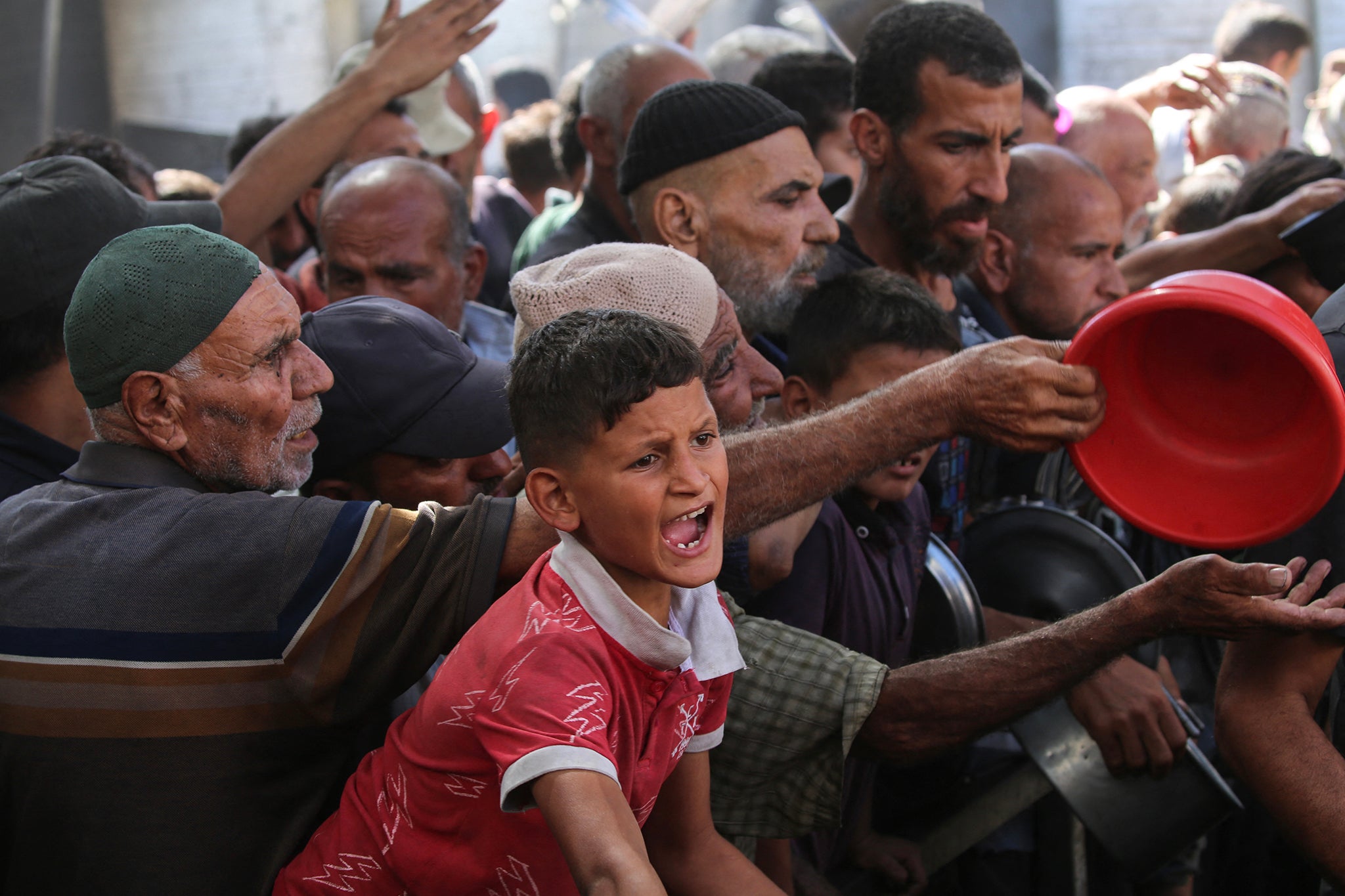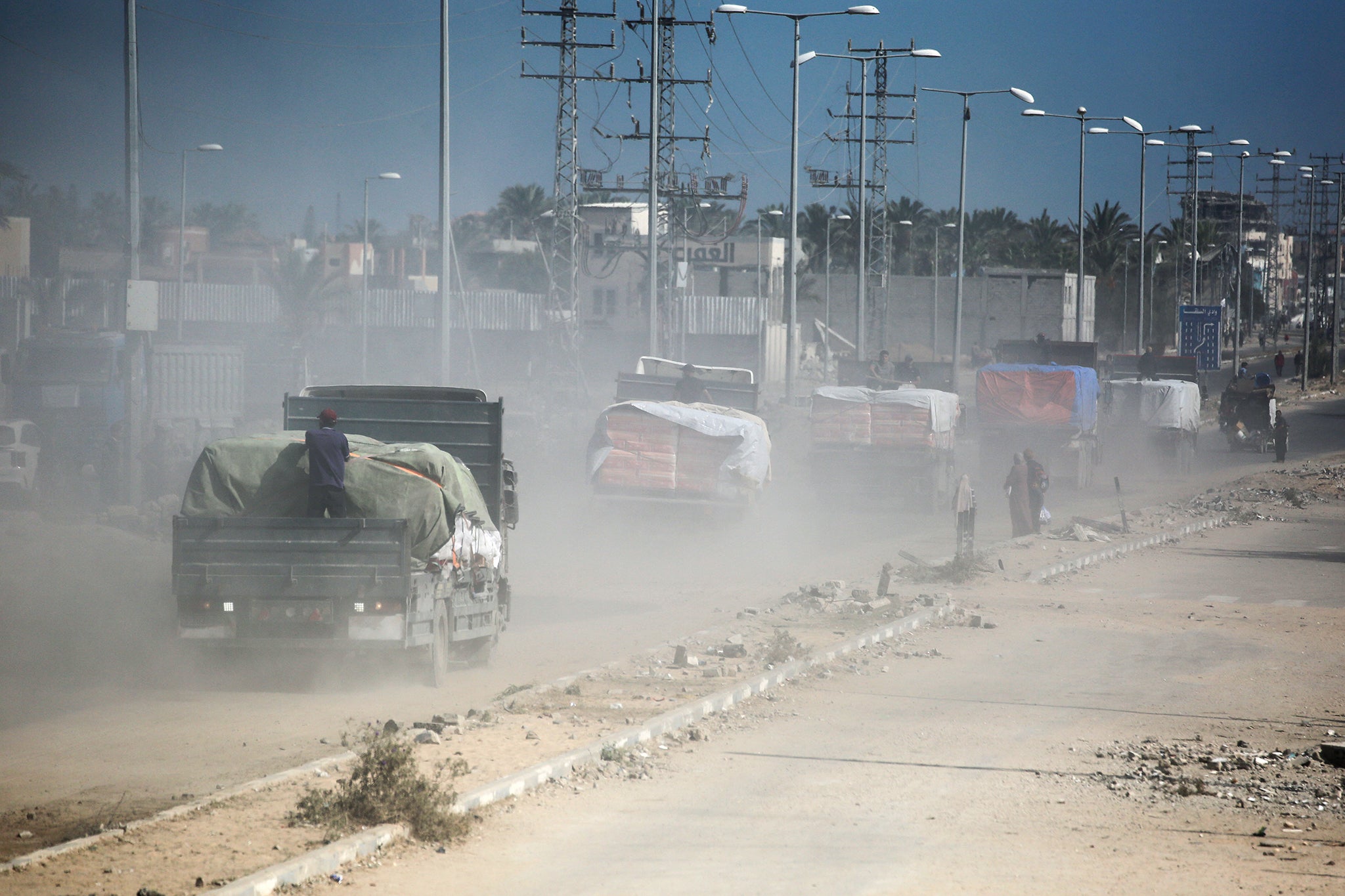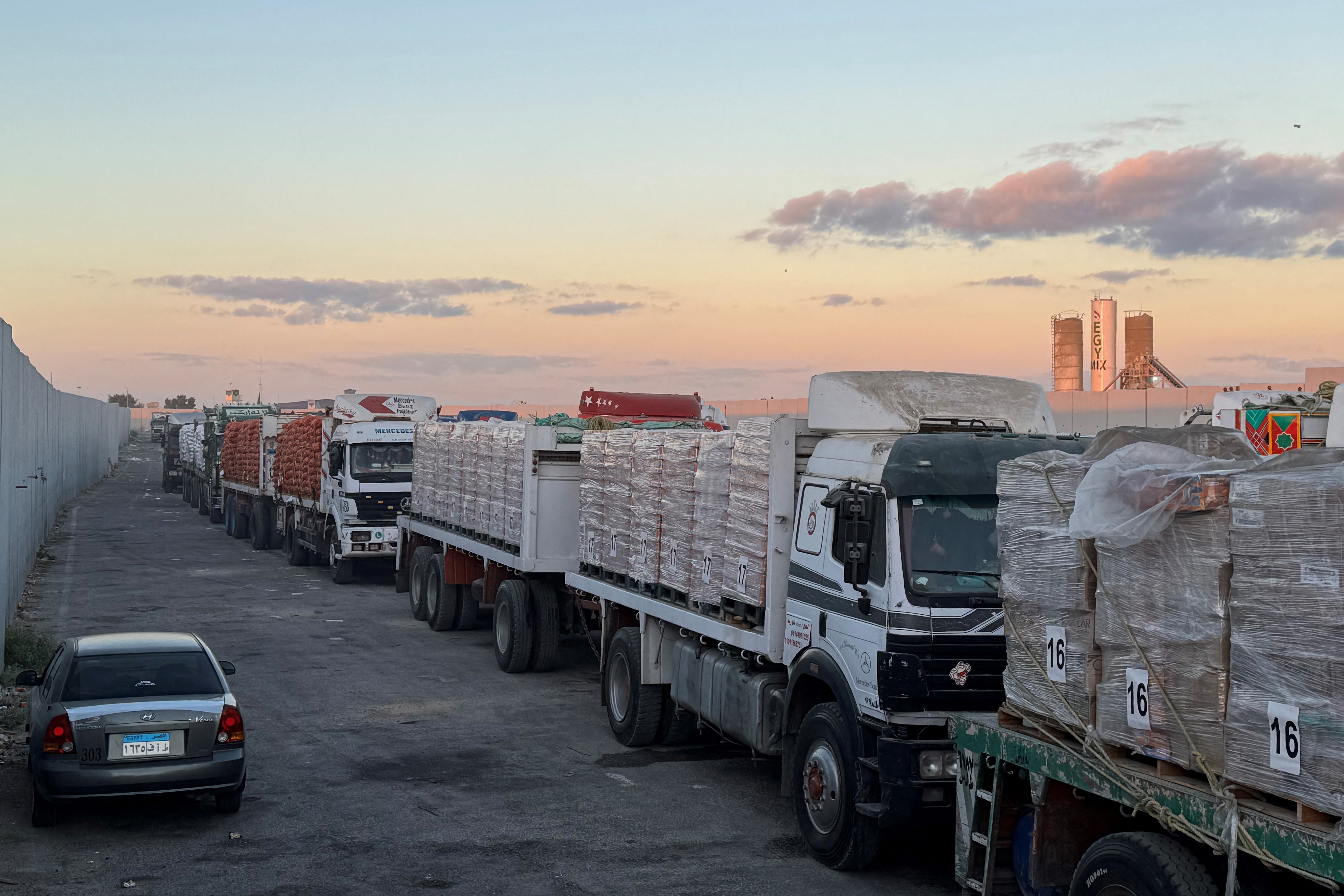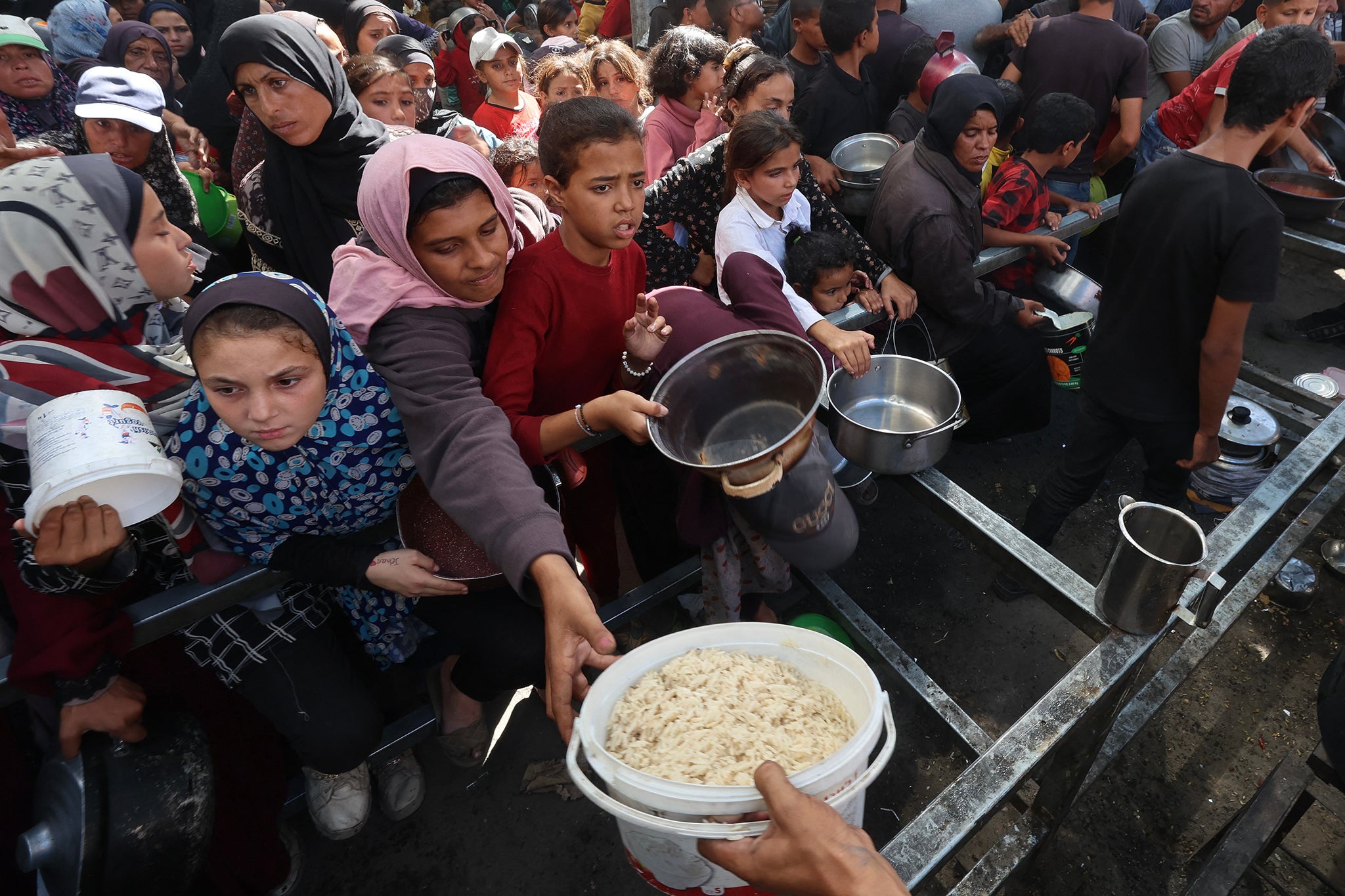World leaders celebrated with several handshakes and photoshoots as a ceasefire was announced and a prisoner-hostage exchange took place on Monday.
But for Palestinians, the promise of truckloads of aid to alleviate famine and a humanitarian crisis, has not been fulfilled.
Israel agreed to let through 4,200 trucks a week, or 600 trucks per day, which it appeared to do on Sunday.
By Tuesday, it threatened to restrict the flow of assistance if the bodies of all dead hostages were not returned and on Wednesday the Rafah crossing into Egypt remained closed. However, aid did continue to be delivered into the enclave by other routes and Israel insisted supplies would be allowed through.
Tom Fletcher, the UN’s humanitarian chief, said: “Earlier this week, we were able to kick off our humanitarian scale-up after months of frustration and blockages. Food, medicine, fuel, water, cooking gas and tents got through to those who need them. We made progress clearing roads and reopening bakeries. We shared in the joy and relief of families reunited.
“But yesterday we faced further setbacks to that implementation. We are now tested to see whether we can ensure that these do not prevent the progress on which President Trump, the UN Secretary-General and so many leaders have insisted.”
On Monday, the crossings were closed due to the hostage exchange and on Tuesday because of the Jewish holiday of Shemini Atzeret.

Confusion erupted on Wednesday as Palestinians were told on Israeli radio that Rafah would be closed due to “logistical” issues, including the clearing of rubble accrued during bombardment. But the Kerem Shalom and Kissufim crossings appeared to remain open.
Unicef has said that the promise of aid had yet to be delivered: “The true test of whether this is underway has not yet happened.”
Groups on the ground in Gaza claimed that many of the trucks being let in were commercial rather than charitable.
Amjad Al-Shawa, director of the Palestinian NGO Network that works with over 800 charitable groups in the region, said that of the 600 trucks let through on Sunday, only 150 were humanitarian and “donation-based”, a small contingent were donated by Egypt and other Arab nations and more than half were commercial carrying food supplies for supermarkets and shops.
Unicef told The Independent that while the organisation could not confirm precise figures, the division of trucks described by Mr Al-Shawa matched their understanding of the situation.
Unicef said it had at least 1,300 trucks waiting at the borders of Gaza, of which only 40 were let through on Sunday and at least 60 were expected to be let through on Wednesday, with some being unloaded already.

The World Food Programme said: “Since the ceasefire began (11 October), WFP has dispatched 186 trucks (2,227 mt) into Gaza to support bakeries, nutrition programmes and general food distributions.”
An Israeli security official denied that there had ever been an agreement to let aid through Rafah. “Humanitarian aid will not pass through the Rafah Crossing,” they said.
“No such agreement has been reached at any stage. The date for opening the crossing for the movement of people only will be announced later.”
Asked about the number of aid trucks entering the Strip, Israeli spokesperson Shosh Bedrosian told a press conference on Wednesday: “Humanitarian aid has never stopped going into the Gaza Strip. It’s something Israel has been committed to – making sure aid goes in and to the populations that need it most ensuring Hamas does not steal it, which we have seen in the past.”

Eyad Amawi, a father-of-three, and a representative of the Gaza Relief Committee based in Nuseirat Camp, said that the needs for civilians is both immense and complex. He told The Independent that the majority of aid being let through consists of flour and canned food.
“There are children, the elderly, and the wounded who still suffer from deep injuries that require nutrition and rich foods to recover properly,” he said.
“Children's wards continue to receive increasing cases of malnutrition as bread alone is not sufficient nourishment. It fills the stomach but does not provide the body with the vitamins and minerals, it needs for a healthy growth.”
He emphasised the importance of medical supplies for the malnourished who are at risk.
Sayeeda, a mother-of-six in Gaza, used to be afraid that her family would be killed in an Israeli air strike. Since the ceasefire was announced she celebrated that they’d survived. But her fear of death has been replaced by a new fear.
“I'm grateful that I'm safe,” she told Unicef’s Tess Ingram in Gaza. “That's the most important thing. But now I'm afraid that while the water truck came yesterday, it might not come today and it might not come tomorrow.”
Ms Ingram said that “every one of the over two million Palestinians is in need of aid” and added: “It’s the small indignities that they have to face every day that may not make headlines.

“Like, digging their own toilet in the sands behind their tent and not having any toilet paper. Or having a newborn baby that gets diarrhoea because there's no clean water and you don't have nappies.
“For teenage girls its menstrual hygiene. These things compound and they eat away at people's days and make their lives almost unbearable.”
The frustrating part for agencies is that the equipment and supplies to meet all the needs of Palestinians is within reach.
“The needs are quite shocking, to be honest. The scale of the needs is immense and it is going to be a very big job for us in the coming days and weeks. We're ready to go. We have the teams on the ground. We've got all the trucks outside.”

.jpeg)


















.png?trim=0,0,0,0&width=1200&height=800&crop=1200:800)






.jpeg)











 English (US) ·
English (US) ·